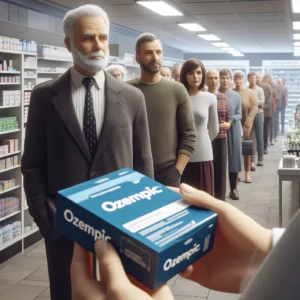FTC’s Bold Move to Address Rising Insulin Prices
The Federal Trade Commission (FTC) is preparing to take significant legal action against major pharmacy benefit managers (PBMs) over practices allegedly contributing to inflated insulin prices. This move marks a crucial step in addressing the ongoing concern of high prescription drug costs in the United States, particularly for essential medications like insulin.
5 Key points
- FTC plans to sue three large U.S. health companies acting as drug price middlemen
- Lawsuits target UnitedHealth Group’s Optum Rx, CVS Health’s Caremark, and Cigna’s Express Scripts.
- FTC argues these PBMs’ tactics contribute to inflated drug prices, including insulin
- The action follows a two-year investigation into PBM practices.
- This move aligns with broader efforts to increase transparency in drug pricing.
Understanding Pharmacy Benefit Managers (PBMs)
Pharmacy Benefit Managers (PBMs) play a complex and often controversial role in the U.S. healthcare system. These entities act as intermediaries between drug manufacturers, insurers, and pharmacies, significantly influencing drug pricing and accessibility. PBMs negotiate rebates and discounts with pharmaceutical companies, ostensibly to lower drug costs for insurers and patients. However, critics argue that this system often leads to higher list prices for drugs, as manufacturers raise prices to offset the rebates they pay to PBMs.
The power of PBMs extends beyond price negotiations. They also create and manage formularies and lists of preferred drugs covered by insurance plans. A drug’s placement on these formularies can significantly impact its market share and, consequently, its profitability for the manufacturer. This gives PBMs considerable leverage in their negotiations with drug companies.
Furthermore, PBMs are responsible for processing and paying prescription drug claims. They determine how much to reimburse pharmacies for the drugs they dispense, a practice that has come under scrutiny for potentially disadvantaging smaller, independent pharmacies in favor of large pharmacy chains – some of which are owned by the PBMs.
The FTC’s Investigation and Findings
The Federal Trade Commission’s investigation into PBM practices, launched in 2022, represents a significant step in addressing long-standing concerns about the opacity of drug pricing in the United States. The comprehensive investigation has examined various aspects of PBM operations and their impact on the pharmaceutical market.
Key findings from the FTC’s interim report include:
- Market Concentration: The report highlights the extreme concentration in the PBM market, with six large PBMs controlling nearly 95% of prescriptions filled in the U.S. This concentration raises concerns about potential anti-competitive practices.
- Vertical Integration: Many large PBMs are owned by or affiliated with major health insurance companies and pharmacy chains. The FTC suggests this vertical integration may create conflicts of interest and potentially harm competition.
- Rebate Practices: The investigation scrutinizes the rebate system, questioning whether it genuinely results in lower prices for consumers or if it instead incentivizes higher list prices for drugs.
- Impact on Independent Pharmacies: The report suggests that PBM practices may disadvantage smaller, independent pharmacies, potentially reducing consumer choice and medication access.
- Lack of Transparency: The FTC criticizes the need for more transparency in PBM operations, making it difficult for policymakers and the public to understand how drug prices are determined.
The planned lawsuits against UnitedHealth Group’s Optum Rx, CVS Health’s Caremark, and Cigna’s Express Scripts are expected to focus specifically on rebate practices and their potential role in inflating insulin prices. These legal actions could force greater transparency in PBM operations and reshape how drug prices are negotiated in the U.S.
Targeted Companies and Their Responses
The FTC’s legal action is set to focus on the three biggest PBMs:
- UnitedHealth Group’s Optum Rx
- CVS Health’s Caremark
- Cigna’s Express Scripts
In response to the news, CVS Caremark stated that they are proud of their work in making insulin more affordable and stand by their record of protecting American businesses, unions, and patients from rising prescription drug prices. Express Scripts argued that drug manufacturers set the prices of insulin and other medicines, emphasizing their role in combating the pharmaceutical industry’s high prices.
Impact on Insulin Prices and Patient Access
The focus on insulin prices in the FTC’s action is particularly noteworthy given the drug’s critical importance and the ongoing affordability crisis for many patients with diabetes. Insulin, a life-saving medication for millions of Americans, has become a prime example of the broader issues in prescription drug pricing.
Insulin prices have risen dramatically over the past two decades, far outpacing inflation. For example, between 2002 and 2013, the average cost of insulin nearly tripled. This increase has led to severe consequences for patients, with some rationing their insulin or preceding other necessities to afford their medication.
The impact of high insulin prices extends beyond individual patients to the broader healthcare system. It contributes to increased hospitalizations due to complications from poorly managed diabetes, raising overall healthcare costs. Furthermore, the high prices disproportionately affect uninsured and underinsured patients, exacerbating health inequities.
Recent policy efforts, such as the $35 monthly cap on insulin costs for Medicare beneficiaries introduced by the Inflation Reduction Act, have started to address this issue. However, this protection only extends to some patients, particularly those with private or no insurance.
The FTC’s action against PBMs could lead to more comprehensive changes in insulin pricing. By targeting the rebate practices and other PBM tactics that allegedly contribute to inflated prices, the FTC aims to address the root causes of high insulin costs. If successful, this could result in more transparent pricing practices and lower insulin prices for a broader range of consumers.
Broader Implications for the U.S. Healthcare System
The FTC’s action against PBMs represents a broader push for transparency and fairness in the U.S. healthcare system. By targeting the practices of these middlemen, the FTC aims to address one of the key factors contributing to high drug prices. This move could reshape the relationship between drug manufacturers, PBMs, insurers, and patients, with far-reaching implications for healthcare costs and medication access.
The Path Forward: Potential Outcomes and Industry Changes
The outcomes of these lawsuits could lead to significant changes in how PBMs operate and how drug prices are negotiated. Potential results may include:
- Increased transparency in rebate negotiations.
- Changes to formulary practices.
- New regulations governing the relationship between PBMs and drug manufacturers.
Ultimately, the goal is to create a more competitive and fair market that benefits patients by reducing insulin prices and improving access to essential medications.
FAQ
Q: Do you qualify for a drug lawsuit?
A: To see if you qualify, click here.
Q: What are Pharmacy Benefit Managers (PBMs)?
A: PBMs are go-betweens in the drug supply chain who negotiate prices with manufacturers on behalf of insurers and employers, create drug formularies, and reimburse pharmacies.
Q: Why is the FTC targeting PBMs?
A: The FTC argues that PBM practices contribute to inflated drug prices, including insulin, at the expense of patients and independent pharmacies.
Q: How might these lawsuits affect insulin prices?
A: If successful, the lawsuits could lead to more transparent pricing practices and lower insulin prices for consumers.
Q: Are drug manufacturers also being investigated?
A: While the FTC’s investigation includes drugmakers, it’s unclear if they will be named in the upcoming lawsuits.
Q: How does this action relate to current insulin price regulations?
A: This action complements existing efforts, like the $35 insulin cap for Medicare beneficiaries, but aims to address pricing issues more broadly.
Citations:
Constantino, A. K., & Wellons, M. C. (2024, July 10). The source says that the Federal Trade Commission is to sue drug middlemen over prices of medications including insulin. CNBC. https://www.cnbc.com/2024/07/10/ftc-to-sue-pbms-over-drug-prices-including-insulin.html







